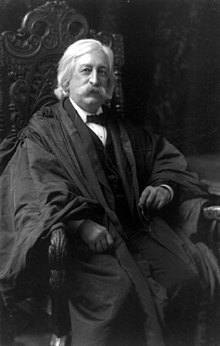Melville W. Fuller
| Melville Fuller | |
|---|---|
 |
|
| 8th Chief Justice of the United States | |
|
In office October 8, 1888 – July 4, 1910 |
|
| Appointed by | Grover Cleveland |
| Preceded by | Morrison Waite |
| Succeeded by | Edward Douglass White |
| Personal details | |
| Born |
Melville Weston Fuller February 11, 1833 Augusta, Maine, U.S. |
| Died | July 4, 1910 (aged 77) Sorrento, Maine, U.S. |
| Political party | Democratic |
| Spouse(s) | Calista Reynolds (1858–1864) Mary Coolbaugh (1866–1910) |
| Children | 6 |
| Education |
Harvard University Bowdoin College (BA, MA) |
| Signature | |
Melville Weston Fuller (February 11, 1833 – July 4, 1910) was the eighth Chief Justice of the United States from 1888 to his death in 1910.
Fuller was born in Augusta, Maine, the son of Catherine Martin (Weston) and Frederick Augustus Fuller. Both his maternal grandfather, Nathan Weston and paternal grandfather, Henry Weld Fuller were judges. His father was a well-known lawyer. His parents divorced shortly after his birth, and he was raised by Nathan Weston. He attended college at Harvard University for one year before graduating from Bowdoin College, Phi Beta Kappa in 1853. He then spent six months at Harvard Law School, leaving without graduating in 1855.
Fuller first studied law under the direction of an uncle. In 1855, he went into partnership with another uncle. He also became the editor of The Age, a leading Democratic newspaper in Augusta, Maine. Soon he got tired of Maine and moved to Chicago. In 1860, he managed Democrat Stephen Douglas' campaign for the Presidency of the United States
At the time, Chicago was becoming the gateway to the West. Railroads had just linked it to the east. Fuller built a law practice in Chicago. Within two years, he appeared before the Supreme Court of Illinois in the case of Beach v. Derby. He became a leading attorney in the city. He first appeared before the United States Supreme Court in the case of Traders' Bank v. Campbell. He also argued the case of Tappan v. the Merchants' National Bank of Chicago, which was the first case heard by Chief Justice Morrison Waite, whom he would later replace.
He was a minor figure in Illinois politics. He spent one term in the Illinois House of Representatives from 1863 to 1865, and was a delegate to the Illinois Constitutional Convention in 1862, and to the national Democratic Conventions of 1864, 1872, 1876, and 1880. In 1876, he made the nominating speech for Thomas Hendricks, for the Democratic nomination for President. After his inauguration as President, Grover Cleveland tried to make Fuller chairman of the United States Civil Service Commission, but he declined. Cleveland then tried to persuade Fuller to accept appointment as Solicitor General of the United States, but Fuller again declined. In 1886, Fuller was president of the Illinois State Bar Association.
...
Wikipedia
